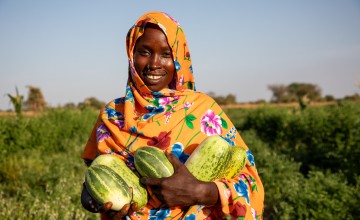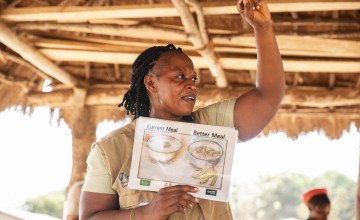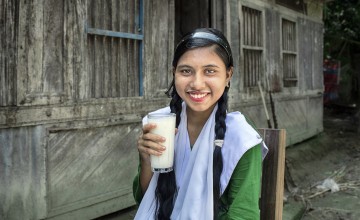
Read our 2024 annual report

Knowledge Hub
First celebrated in 1979, World Food Day takes place annually on October 16.
The UN holiday promotes awareness of hunger and action for the future of food, people, and the planet. 2025’s celebrations carry an additional significance as this year marks the 80th anniversary of the Food and Agriculture Organisation’s founding.
Here’s what you need to know about the holiday’s significance and history, how Concern is marking World Food Day 2025, and how you can get involved.
What is the theme for World Food Day 2025?
This year’s World Food Day theme is: “Hand in Hand for Better Foods and a Better Future.” With this comes a call from the FAO for global collaboration “in creating a peaceful, sustainable, prosperous, and food-secure future.”
Ending hunger is only going to be truly possible with international cooperation and teamwork, as well as strong communities at the local level. While the world produces enough food to feed all 8+ billion people, many of the reasons people go hungry come down to a lack of a shared common vision: conflicts block food access and interrupt vital trade lines, the countries suffering the most from the climate crisis are also those who have the fewest resources (and often the least responsibility for the crisis as it is), and many of the world’s farmers are struggling to feed their own families.
Here are a few ways that this year’s World Food Day theme resonates in some of the countries where Concern works.
Hand in hand in Chad

Chad continually ranks among the hungriest countries in the world, owing in part to a combination of conflict and climate change. Concern has recently launched Concerted and Inclusive Development in the Lake Province (DECILAC), a ground-breaking project supported by Facilité G5 Sahel.
Centred in the country’s Lac Province, the project is focused on inclusively investing in food security and strengthening local value chains. We’re working with communities to build both financial and climate resilience, while also fostering a diversity of diets through redeveloping agricultural polders and constructing fish markets. We’re also supporting these forms of dietary diversity through Chronic Humanitarian Crisis, an Irish Aid-funded programme supporting market gardening and artisanal fishing groups.
Hand in hand in Sierra Leone

In Sierra Leone, a new initiative called Yoti Yoti has been designed to help build food and nutrition security through equitable and climate-smart food systems. The five-year project is funded by Irish Aid under Ireland’s Civil Society Partnership for a Better World (ICSP) and focuses on creating availability, access, utilisation, and stability of food sources.
The outcomes include inclusive participation in Climate Smart Agriculture, better market access for those living in extreme poverty, stable consumption of an adequate and affordable diet, and generating evidence to help inform policy at the local and national level. We aim to reach 21,000 people with this initiative, which we’re running across 64 communities in the Tonkolili and Port Loko districts. In the first year of the project, we reached nearly 9,500.
Hand in hand in Bangladesh

Hand in hand can also cut across sectors, as hunger is an intersectional issue. With 75% of the country sitting below sea-level, Bangladesh is one of the countries most vulnerable to the effects of climate change, for those living below the poverty line. Concern recently led a multi-year consortium project (in partnership with WaterAid Bangladesh, Rupantar, and Jagrata Juba Shangha) to create an innovative and scalable nutrition governance model.
Collective Responsibility Action and Accountability for Improved Nutrition (CRAAIN) took a community-based and intersectional approach to undernutrition in key areas. Through consultation and group meetings as well as practical training and supplies, low-income families were able to improve their diets and grow a wider range of nutritious fruits and vegetables in their yards. In addition to healthy food, participants learned about health and hygiene, gender, and social safety issues. Between 2020 and 2023, CRAAIN reached nearly half a million people.
Why is World Food Day important?
The proverbial “now more than ever” applies to World Food Day’s importance. Initially established to mark the anniversary of the founding of the Food and Agriculture Organisation, World Food Day goes hand-in-hand with the FAO’s mission to end world hunger and improve the standard of living for people living in rural areas.
It also goes hand-in-hand with the missions of organisations that work with the FAO, like Concern. October 16 is a touchpoint for NGOs — and for the world; a reminder that hunger, food insecurity, and malnutrition are among the most pressing issues of our time, and getting worse the closer we get to the 2030 goal of Zero Hunger.
» Related: Why is it important to end world hunger?
World Food Day at Concern
Concern’s annual Global Hunger Index, co-published with Welthungerhilfe, will launch on October 9 this year, just before World Food Day. An award-winning “report card” for world hunger, the GHI measures hunger based on four key indicators: Undernourishment, child wasting, child stunting, and child mortality rates.
How to celebrate World Food Day
World Food Day is a great reason to learn more about the state of world hunger in 2025. In addition to checking out the GHI and our top 10 hungriest countries, see below for a few other resources that you can read and share today (and every other day).
This October, Concern Worldwide is asking everyone to gather their friends, family, neighbours and colleagues to share a meal and raise essential funds for the people of Gaza. Whether you host a cosy dinner, an office lunch or a coffee morning – every euro raised will go directly to our partner’s response in Gaza.





